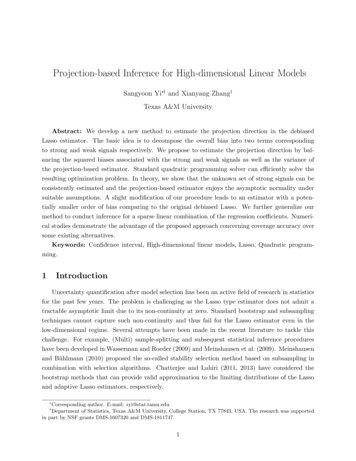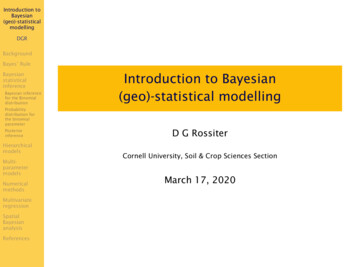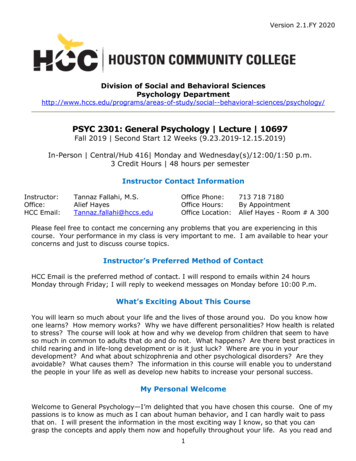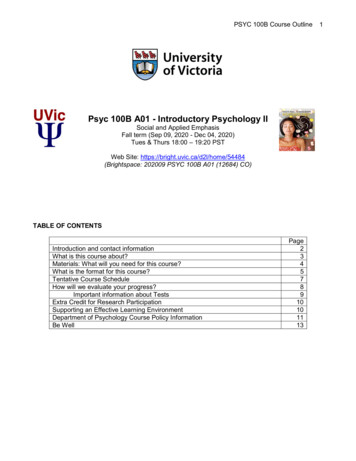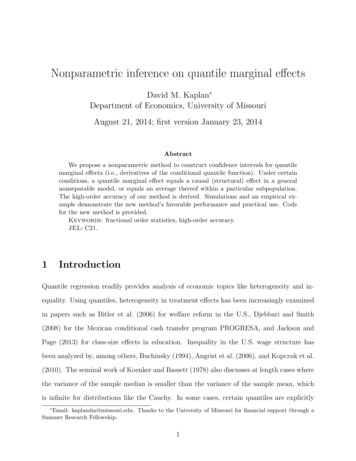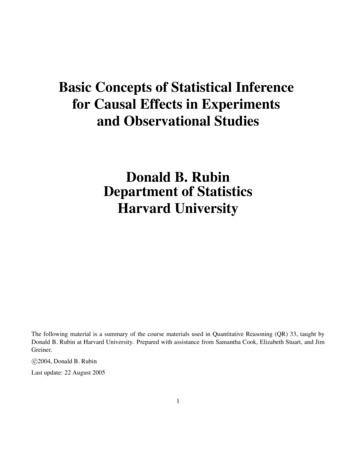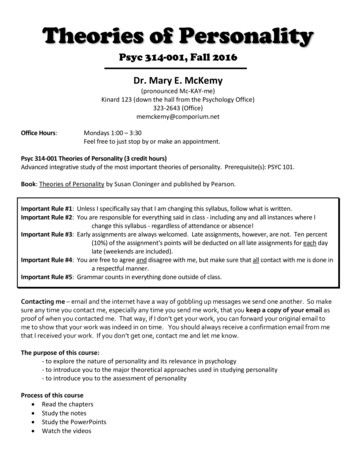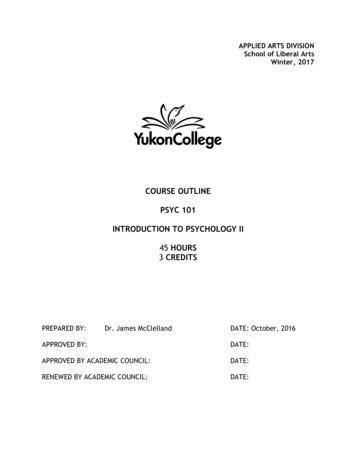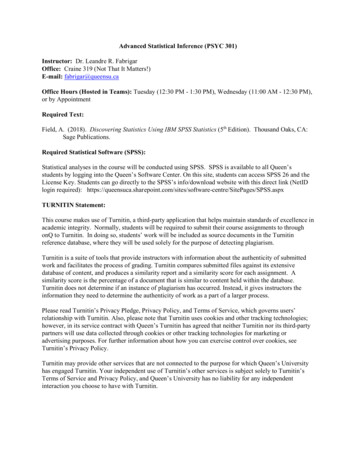
Transcription
Advanced Statistical Inference (PSYC 301)Instructor: Dr. Leandre R. FabrigarOffice: Craine 319 (Not That It Matters!)E-mail: fabrigar@queensu.caOffice Hours (Hosted in Teams): Tuesday (12:30 PM - 1:30 PM), Wednesday (11:00 AM - 12:30 PM),or by AppointmentRequired Text:Field, A. (2018). Discovering Statistics Using IBM SPSS Statistics (5th Edition). Thousand Oaks, CA:Sage Publications.Required Statistical Software (SPSS):Statistical analyses in the course will be conducted using SPSS. SPSS is available to all Queen’sstudents by logging into the Queen’s Software Center. On this site, students can access SPSS 26 and theLicense Key. Students can go directly to the SPSS’s info/download website with this direct link (NetIDlogin required): ntre/SitePages/SPSS.aspxTURNITIN Statement:This course makes use of Turnitin, a third-party application that helps maintain standards of excellence inacademic integrity. Normally, students will be required to submit their course assignments to throughonQ to Turnitin. In doing so, students’ work will be included as source documents in the Turnitinreference database, where they will be used solely for the purpose of detecting plagiarism.Turnitin is a suite of tools that provide instructors with information about the authenticity of submittedwork and facilitates the process of grading. Turnitin compares submitted files against its extensivedatabase of content, and produces a similarity report and a similarity score for each assignment. Asimilarity score is the percentage of a document that is similar to content held within the database.Turnitin does not determine if an instance of plagiarism has occurred. Instead, it gives instructors theinformation they need to determine the authenticity of work as a part of a larger process.Please read Turnitin’s Privacy Pledge, Privacy Policy, and Terms of Service, which governs users’relationship with Turnitin. Also, please note that Turnitin uses cookies and other tracking technologies;however, in its service contract with Queen’s Turnitin has agreed that neither Turnitin nor its third-partypartners will use data collected through cookies or other tracking technologies for marketing oradvertising purposes. For further information about how you can exercise control over cookies, seeTurnitin’s Privacy Policy.Turnitin may provide other services that are not connected to the purpose for which Queen’s Universityhas engaged Turnitin. Your independent use of Turnitin’s other services is subject solely to Turnitin’sTerms of Service and Privacy Policy, and Queen’s University has no liability for any independentinteraction you choose to have with Turnitin.
2Course Objectives and Format:This course is designed to provide students with an introduction to basic inferential statistics as they areused in psychology and related disciplines. Course lectures will provide students with a basic conceptualintroduction to key statistical concepts in inferential statistics. Lectures will also provide a conceptualintroduction to commonly used statistical procedures such as t Tests, One-Way ANOVA, FactorialANOVA, correlation, and simple regression. Course labs will provide students with hands-on instructionin how to conduct statistical analyses using IBM SPSS Statistics.Exams:There will be two take home exams. These exams will be a mixture of short answer, long answer, andessay questions. The midterm exam will include material covered in approximately the first half of theterm. The final exam will cover material throughout the entire term, although a greater emphasis will beplaced on material covered post-midterm. The midterm and final exams will be made available in onQ atleast 24 hours prior to the deadline for submission. The emphasis of exam questions will be on materialcovered in lecture, although some questions may be drawn from the text. The midterm will be weighted20% of the total course mark and the final exam will be weighted 40% of the total course mark. It isexpected that students will write both exams. If there is a valid medical reason or other important lifecircumstance that requires a student to miss the midterm exam, the general policy will be to prorate themidterm exam to the final exam and the remaining lab assignments. It is course policy that answers onexams submitted by students will be solely their own work and that students will not discuss the contentof exams with other people prior to submission of their work or with a student who has yet to submit theexam. Any questions regarding exams should be directed to the instructor or one of the course teachingassistants.Labs Assignments:Interspersed throughout the term will be 5 lab assignments. These lab assignments will focus onproviding you with hands-on experience in conducting statistical analyses using SPSS. Lab assignmentswill be posted in onQ for download 12 days prior to their due date. Lab assignments will be submitted formarking in onQ. Each lab assignment will be weighted 8% of your total course mark. It is expected thatstudents will complete all lab assignments. If there is a valid medical reason or other important lifecircumstance that requires a student to miss submitting an assignment, the general policy will be toprorate the lab assignment to the final exam and the remaining lab assignments. It is course policy thatanswers on lab assignments submitted by students will be solely their own work and that students willnot discuss the content of lab assignments with other people prior to submission of their work or with astudent who has yet to submit the lab assignment. Any questions regarding lab assignments should bedirected to the instructor or one of the course teaching assistants. All students will be assigned to labsections. You will have a teaching assistant (TA) responsible for your lab section. This TA will hold aweekly virtual office hour in which you can ask any questions you might have regarding a pending labassignment. Virtual office hours will be hosted in Teams (direct link to each lab section team on the onQCourse Homepage). This TA will also mark your lab assignments and provide you with feedbackregarding your performance on the assignment.
3Weekly Instructor Office Hours:The instructor will hold virtual two virtual office hour sessions each week. These office hours will behosted in Teams (direct link to course team on the onQ Course Homepage). During that time, theinstructor will answer any questions you might have regarding lecture material and the course moregenerally.Teaching Assistants, Lab Sections, and Lab Office Hours:Natasha Drobotenko (Sections 1 & 2): Office Hours (Mon. 2:30 PM-3:30 PM, Mon. 3:30 PM-4:30 PM)/Email (nd56@queensu.ca)James Hillman (Sections 3 & 4): Office Hours (Wed. 12:30 PM-1:30 PM, Thur. 12:30 PM-1:30PM)/Email (jh250@queensu.ca)Larah Maunder (Section 5): Office Hour (Wed. 9:30 AM-10:30 AM)/Email (lm178@queensu.ca)Minqian (Charlie) Shen (Section 6): Office Hour (Wed. 4:00 PM-5:00 PM)/Email (ms370@queensu.ca)Kate Zucconi (Section 7): Office Hour (Thur. 9:00 AM -10:00 AM)/(Email ketz@queensu.ca)Erika Peter (Head Teaching Assistant)/Email (elp5@queensu.ca)Grading:Midterm Exam (20%)Lab 1 (8%)Lab 2 (8%)Lab 3 (8%)Lab 4 (8%)Lab 5 (8%)Final Exam (40%)All components of this course will receive numerical percentage marks. The final grade you receive forthe course will be derived by converting your numerical course average to a letter grade according toQueens Official Grade Conversion Scale:Queen’s Official Grade Conversion ScaleNumerical CourseGradeAverage (Range)A 90-100A85-89A80-84B 77-79B73-76B70-72C 67-69C63-66C60-62D 57-59D53-56D50-52F49 and below
4Statement on Academic Integrity:Queen’s students, faculty, administrators and staff all have responsibilities for upholding the fundamentalvalues of academic integrity; honesty, trust, fairness, respect, responsibility and courage (seewww.academicintegrity.org). These values are central to the building, nurturing and sustaining of anacademic community in which all members of the community will thrive. Adherence to the valuesexpressed through academic integrity forms a foundation for the "freedom of inquiry and exchange ofideas" essential to the intellectual life of the University (see the Senate Report on Principles andPriorities report-principles-and-priorities).Students are responsible for familiarizing themselves with the regulations concerning academic integrityand for ensuring that their assignments and their behaviour conform to the principles of academicintegrity. Information on academic integrity is available in the Arts and Science Calendar (see AcademicRegulation 1 gulations/academicregulations/regulation-1), on the Arts and Science website (see ademic-integrity), and from the instructor of this course. Departures from academic integrityinclude plagiarism, use of unauthorized materials, facilitation, forgery and falsification, and areantithetical to the development of an academic community at Queen's. Given the seriousness of thesematters, actions which contravene the regulation on academic integrity carry sanctions that can rangefrom a warning or the loss of grades on an assignment to the failure of a course to a requirement towithdraw from the university.Accommodations Statement:Queen's University is committed to achieving full accessibility for people with disabilities. Part of thiscommitment includes arranging academic accommodations for students with disabilities to ensure theyhave an equitable opportunity to participate in all of their academic activities. The Senate Policy forAccommodations for Students with Disabilities was approved at Senate in November 2016 teandtrustees/ACADACCOMMPOLICY2016.pdf). If you are a student with a disability and think you may needacademic accommodations, you are strongly encouraged to contact the Queen's Student AccessibilityServices (QSAS) and register as early as possible. For more information, including important deadlines,please visit the QSAS website at: y-services/Academic Considerations for Students in Extenuating Circumstances:Queen’s University is committed to providing academic consideration to students experiencingextenuating circumstances that are beyond their control and are interfering with their ability to completeacademic requirements related to a course for a short period of time. The Senate Policy on AcademicConsideration for Students in Extenuating Circumstances is available uating%20Circumstances%20Policy%20Final.pdfEach Faculty has developed a protocol to provide a consistent and equitable approach in dealing withrequests for academic consideration for students facing extenuating circumstances. Arts and Scienceundergraduate students can find the Faculty of Arts and Science protocol and the portal where a request
5can be submitted at: http://www.queensu.ca/artsci/accommodations. Students in other Faculties andSchools who are enrolled in this course should refer to the protocol for their home Faculty.If you need to request academic consideration for this course, you will be required to provide the nameand email address of the instructor/coordinator. Please use the following:Instructor/Coordinator Name: Leandre R. FabrigarInstructor/Coordinator email address: fabrigar@queensu.caTiming of Final Examinations:The exam dates for each Term are listed on the Faculty of Arts and Science webpage under “ImportantDates. Student exam schedules for the Fall Term are posted via SOLUS immediately prior to theThanksgiving holiday; for the Winter Term they are posted on the Friday before Reading Week, and forthe Summer Term they are individually noted on the Arts and Science Online syllabi. Students shoulddelay finalizing any travel plans until after the examination schedule has been posted. Exams willnot be moved or deferred to accommodate employment, travel/holiday plans or flight reservations.Copyright of Course MaterialsCourse materials created by the course instructor, including all slides, presentations, handouts, tests,exams, and other similar course materials, are the intellectual property of the instructor. It is a departurefrom academic integrity to distribute, publicly post, sell or otherwise disseminate an instructor’s coursematerials or to provide an instructor’s course materials to anyone else for distribution, posting, sale orother means of dissemination, without the instructor’s express consent. A student who engages in suchconduct may be subject to penalty for a departure from academic integrity and may also face adverselegal consequences for infringement of intellectual property rights.
6Course OutlineTopicReadingsWeek 1:(Sept. 8-11)Course OverviewMaking Claims with Statistics-Statistics as Principled Arguments-Using Inferential Statistics to Distinguish Among Claims-Systematic versus Chance Explanations-The Language and Limitations of Null Hypothesis Testing-The Quality of Statistical Evidence: MAGICCh. 1-2Week 2:(Sept. 14-18)Elementary Arguments and the Role of Chance-Random Sampling Processes as Explanation-Known Causes as Explanation for Departure from Randomness-The Independent Sample t Test-Setting Alpha: One-Tailed, Two-Tailed, and “Lopsided” Tests-Setting Beta: Power-The Repeated Measures t TestCh. 10Week 3:(Sept. 21-25)Elementary Arguments and the Role of Chance (continued)-Random Sampling Processes as Explanation-Known Causes as Explanation for Departure from Randomness-The Independent Sample t Test-Setting Alpha: One-Tailed, Two-Tailed, and “Lopsided” Tests-Setting Beta: Power-The Repeated Measures t TestLAB 1 Due (September 25, 11:59 PM)Ch. 10Week 4:(Sept. 28Oct. 2)Magnitude of Effects-Probability Measures: The p value and Bayesian Measures-Effect Sizes: Raw Effect Sizes and Standardized Effect Sizes-Interpreting Effect Sizes-Confidence IntervalsWeek 5:(Oct. 5-9)More Complex Hypotheses: Multiple Levels of IVsCh. 12, 15-One-Way ANOVA (Between-Subjects)-Post-hoc comparisons and Family-Wise Error in ANOVA-Power and effect size in ANOVA-One-Way ANOVA (Repeated Measures)-Repeated Measures ANOVA post hoc comparisons, power, and effect sizesLAB 2 Due (October 9, 11:59 PM)Ch. 3
7TopicReadingsWeek 6:(Oct. 12-16)Thanksgiving(October 12)More Complex Hypotheses: Multiple Levels of IVs (Continued)-One-Way ANOVA (Between-Subjects)-Post-hoc comparisons and Family-Wise Error in ANOVA-Power and effect size in ANOVA-One-Way ANOVA (Repeated Measures)-Repeated Measures ANOVA post hoc comparisons, power,and effect sizesMidterm Exam Due (October 16, 11:59 PM)Ch. 12, 15Week 7:(Oct. 19-23)Considering Data “Fishiness”-Assumptions of the independent samples t Test and theBetween-Subjects ANOVA-Assumptions of the repeated measures t Test and theRepeated Measures ANOVA-Evaluating assumptions and responses to assumption violations-Related data considerations: scales of measurement and outliersCh. 6Fall Midterm Break (Oct. 26-30)Week 8:(Nov. 2-6)More Complex Hypotheses: Two IVs-The logic of multiple IVs-Interactions: Testing Moderation-The two-factor ANOVA (Between-Subjects)-Follow up comparisons in the two-factor ANOVA-Power and effect size in the two-factor ANOVA-Assumptions in the two-factor ANOVALAB 3 Due (November 6, 11:59 PM)Ch. 14Week 9:(Nov. 9-13)More Complex Hypotheses: Two IVs (Continued)-The logic of multiple IVs-Interactions: Testing Moderation-The two-factor ANOVA (Between-Subjects)-Follow up comparisons in the two-factor ANOVA-Power and effect size in the two-factor ANOVA-Assumptions in the two-factor ANOVACh. 14
8TopicReadingsWeek 10:(Nov. 16-20)Hypotheses with Continuous Variables: Correlation andRegression-Characterizing relationships between continuos variables-The Pearson correlation coefficient-Understanding and interpreting correlations-Alternative measures of association-Simple regression and prediction-Standard error of estimate-Hypotheses for Regression-Standard and Unstandardized Solutions-Hypotheses for Regression-Standard and Unstandardized SolutionsLAB 4 Due (November 20, 11:59 PM)Ch. 8, 9Week 11:(Nov. 23-27)Hypotheses with Continuous Variables: Correlation andRegression (Continued)-Characterizing relationships between continuos variables-The Pearson correlation coefficient-Understanding and interpreting correlations-Alternative measures of association-Simple regression and prediction-Standard error of estimateCh. 8, 9Week 12:(Nov. 30Dec. 4, 7)MAGIC: Further Considerations-Articulation: Ticks and buts-Generality-Interestingness-Credibility-MAGIC considered in totalityLAB 5 Due (December 4, 11:59 PM)Final Exam (December 10-23)
Discovering Statistics Using IBM SPSS Statistics (5th Edition). Thousand Oaks, CA: Sage Publications. Required Statistical Software (SPSS): Statistical analyses in the course will be conducted using SPSS. SPSS is available to all Queen's students by logging into the Queen's Software Center. On this site, students can access SPSS 26 and the
